2024年中考英语复习必备知识课件(共29张PPT)
文档属性
| 名称 | 2024年中考英语复习必备知识课件(共29张PPT) | 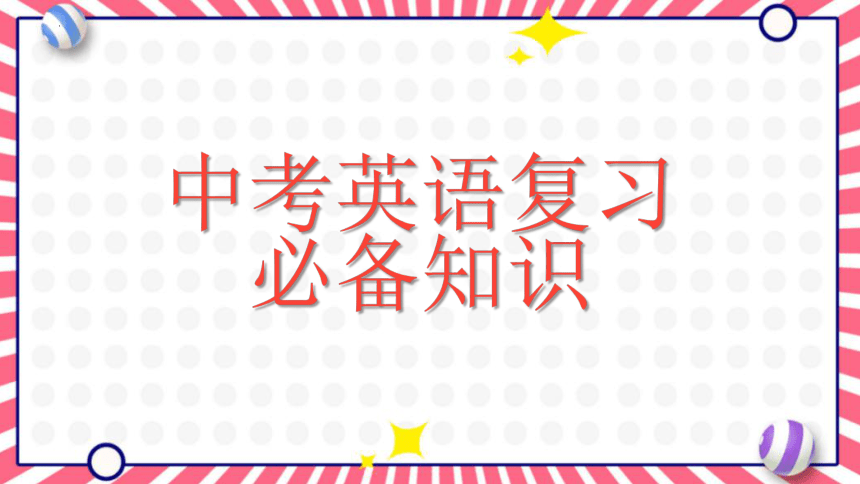 | |
| 格式 | pptx | ||
| 文件大小 | 11.9MB | ||
| 资源类型 | 教案 | ||
| 版本资源 | 通用版 | ||
| 科目 | 英语 | ||
| 更新时间 | 2024-06-13 06:34:02 | ||
图片预览

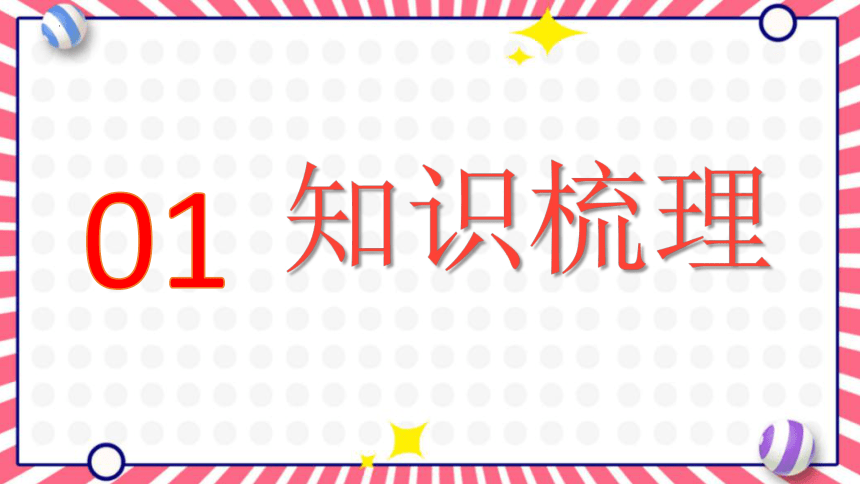
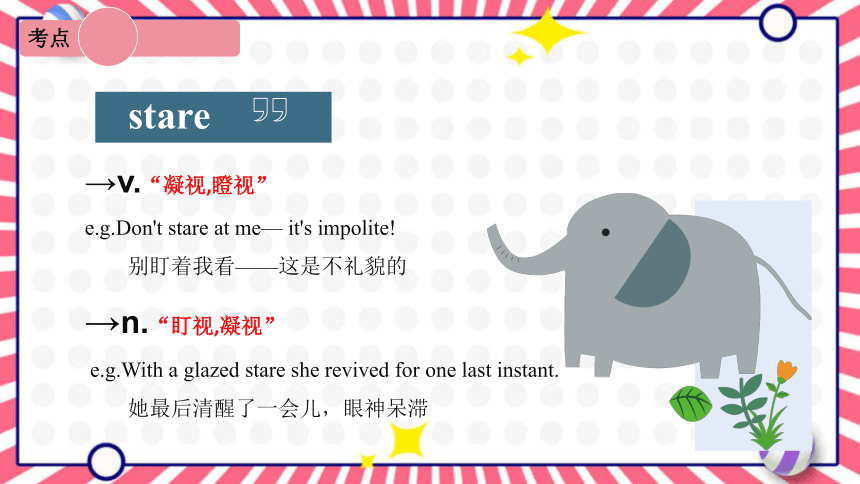
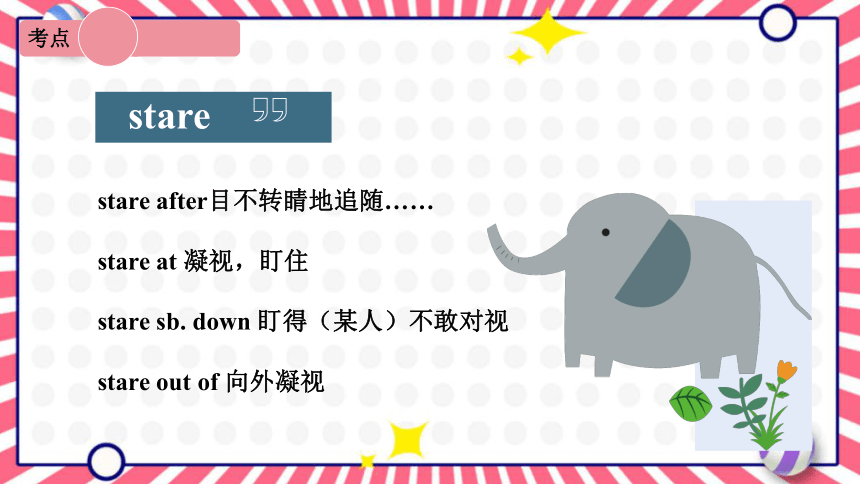
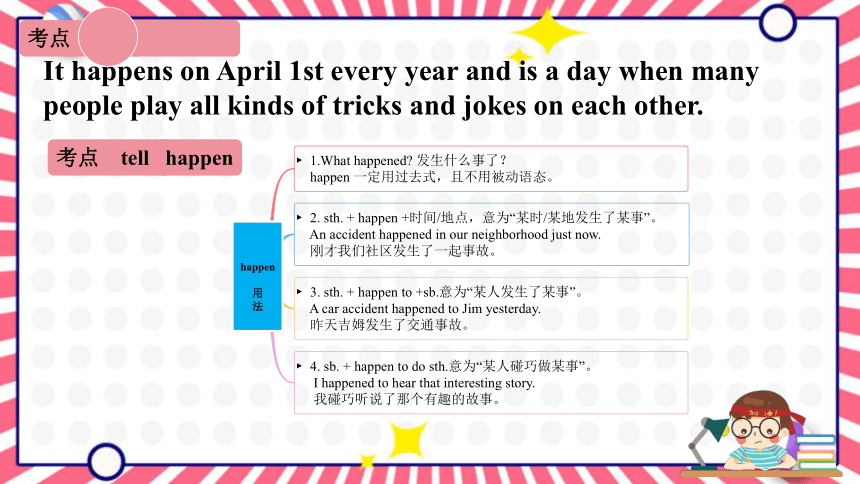
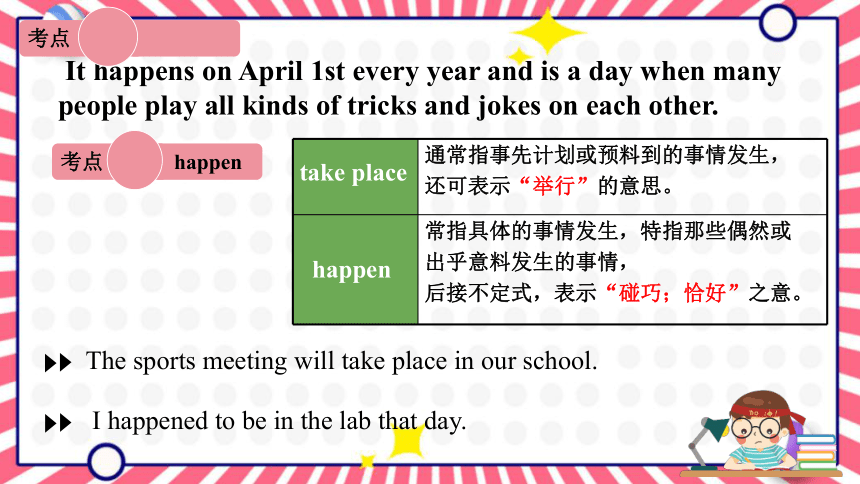
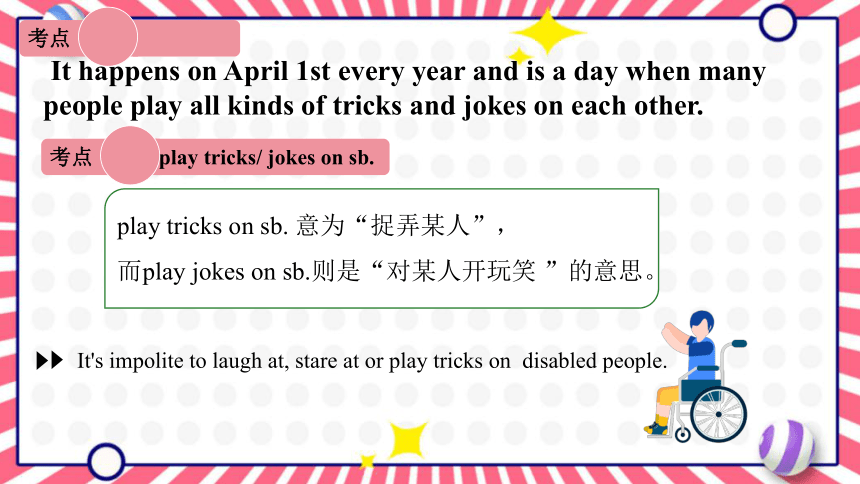
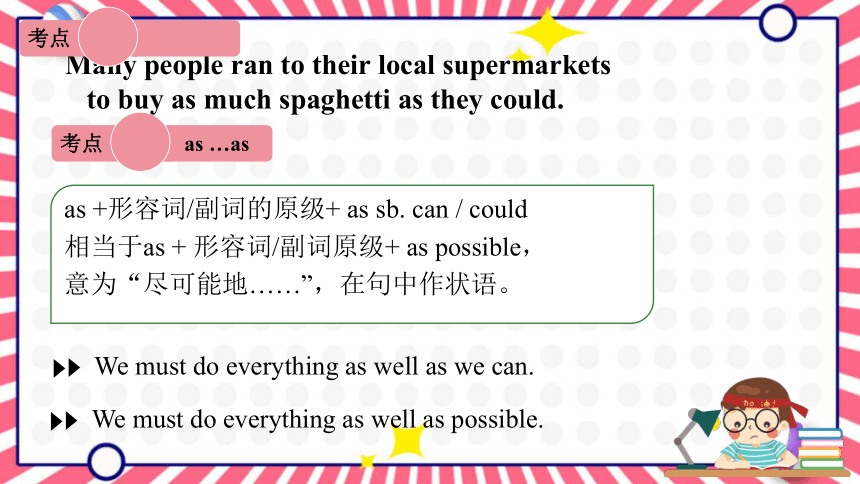
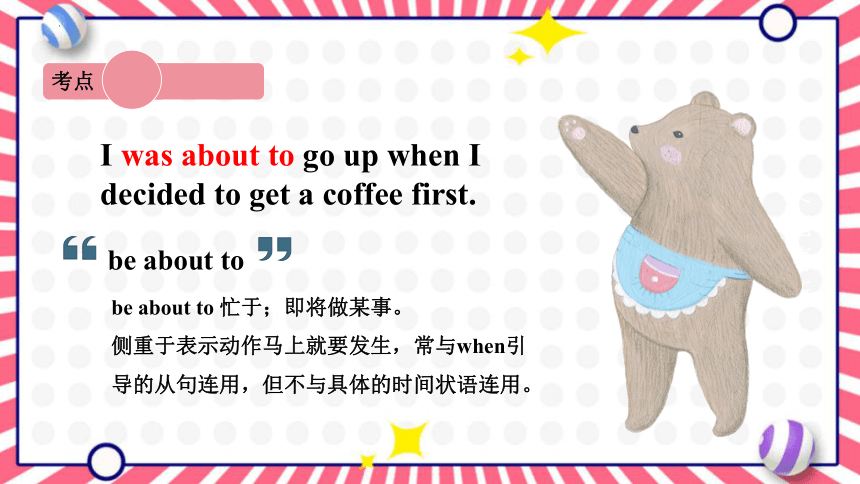
文档简介
(共29张PPT)
中考英语复习
必备知识
知识梳理
01
→v.“凝视,瞪视”
e.g.Don't stare at me— it's impolite!
别盯着我看——这是不礼貌的
→n.“盯视,凝视”
e.g.With a glazed stare she revived for one last instant.
她最后清醒了一会儿,眼神呆滞
stare
考点 tell
stare
stare after目不转睛地追随……
stare at 凝视,盯住
stare sb. down 盯得(某人)不敢对视
stare out of 向外凝视
考点 tell
考点 tell
happen
It happens on April 1st every year and is a day when many people play all kinds of tricks and jokes on each other.
happen
用
法
1.What happened 发生什么事了?
happen 一定用过去式,且不用被动语态。
3. sth. + happen to +sb.意为“某人发生了某事”。
A car accident happened to Jim yesterday.
昨天吉姆发生了交通事故。
2. sth. + happen +时间/地点,意为“某时/某地发生了某事”。
An accident happened in our neighborhood just now.
刚才我们社区发生了一起事故。
4. sb. + happen to do sth.意为“某人碰巧做某事”。
I happened to hear that interesting story.
我碰巧听说了那个有趣的故事。
考点 tell
考点 tell
happen
It happens on April 1st every year and is a day when many people play all kinds of tricks and jokes on each other.
The sports meeting will take place in our school.
I happened to be in the lab that day.
take place 通常指事先计划或预料到的事情发生,
还可表示“举行”的意思。
happen 常指具体的事情发生,特指那些偶然或
出乎意料发生的事情,
后接不定式,表示“碰巧;恰好”之意。
考点 tell
play tricks on sb. 意为“捉弄某人”,
而play jokes on sb.则是“对某人开玩笑 ”的意思。
考点 tell
play tricks/ jokes on sb.
It happens on April 1st every year and is a day when many people play all kinds of tricks and jokes on each other.
It's impolite to laugh at, stare at or play tricks on disabled people.
考点 tell
as +形容词/副词的原级+ as sb. can / could
相当于as + 形容词/副词原级+ as possible,
意为“尽可能地……”,在句中作状语。
考点 tell
as …as
Many people ran to their local supermarkets
to buy as much spaghetti as they could.
We must do everything as well as we can.
We must do everything as well as possible.
考点 tell
文艺清新
be about to 忙于;即将做某事。
侧重于表示动作马上就要发生,常与when引导的从句连用,但不与具体的时间状语连用。
be about to
I was about to go up when I decided to get a coffee first.
考点 tell
文艺清新
as 当……时,引导时间状语从句
As
As I was waiting in line with other office workers, I heard a loud sound.
尝试翻译一下叭!
当我和其他办公室职员排队等候时,我听到一声巨响。
考点 tell
文艺清新
宾语从句,陈述语序。go on 发生
what was going on
Before I could join the others outside to see what was going on, the first plane had already hit my office building.
had hit
had done 过去完成时,表示过去已经做过
考点 tell
Life is full of the unexpected.
unexpected adj. 出乎意料的;始料不及的
e.g. It will not be unexpected if Tom comes late again, because he is always like this.
如果汤姆又迟到了,一点也不意外,因为他一向如此。
Life is full of the unexpected.
“the + 形容词”表示一类人或物
考点 tell
By the time I got up, my brother had already gotten in the shower.
by the time 在……以前,常引导表示过去的时间状语从句,主句常用过去完成时,即had + 动词过去分词。
e.g. By the time I got there, he had already left.
在我到那儿之前,他已经离开了。
考点 tell
When I got home, I realized I had left my keys in the backpack.
leave v. 忘了带;丢下
I left my bag on the bus.
Don’t leave the child by himself at home.
leave+宾语+地点状语 把······忘在某地
leave sb. by oneself 把某人单独留下
leave
【易混辨析】leave与forget
两词都可以表示“遗忘”的意思,其区别如下:
Sorry, I forgot my English book. I left it at home.
leave 通常与地点状语连用,表示将某物遗忘在某地。
forget 不与地点状语连用,表示忘记带某物。
考点 tell
So I just quickly put on some clothes...
put on 穿上
Please put on warm clothes when it’s cold.
You’d better put it on when you go out.
put on是动副短语,强调动作,反义短语是take off。其宾语若是代词,代词要放在put与on中间。
【拓展】put on的其他用法:
(1)增加(体重);发胖
Jenny put on 3 kilos during the Spring Festival.
(2)上演;举办
They sold their second-hand books, put on talent shows and asked for donations, even going door-to-door for them.
考点 tell
What happened
happen 发生,不及物动词。
(1) “sth.+happen+地点/时间”,“某地/某时发生了某事”
e.g. What happened last night
昨晚发生了什么事
(2) “sth. + happen to + sb.” 意为“某人出了某事(常指不好的事发生在某人身上)”。
e.g. A car accident happened to him yesterday.
昨天他发生了交通事故。
(3) “sb. + happen + to do sth.” 意为“某人碰巧做某事”
e.g. I happened to meet her in the street yesterday.
我昨天碰巧在街上遇见她。
考点 tell
Well, the more I get to know Julie, the more I realize that we have a lot in common
the+比较级+从句 ,the +比较级+从句“越……, 越……”
e.g. The harder you work, the greater progress you will make.
你越用功,进步就越大。
考点 tell
Why don't you ask Alice to join you each time you do something with Julie
Why don't you do sth 是一个否定疑问句,意为“为什么不……?”常用来征求意见和提出建议,相当于“Why not do sth ”
例如:Why don't you go with us = Why not go with us
为什么不同我们一起去呢?
考点 tell
Guess the meaning of the idioms.
1. Don't keep silent. Let's break the ice.
2. I'm feeling a bit under the weather. I've been coughing since
this morning.
3. I'm really not on the ball today. I didn't get enough sleep
last night.
4. It rains cats and dogs.
打破沉默
(借助天气表达)身体不舒服。
精力集中,反应灵敏。
(下雨)猛烈地;大量地
考点 tell
What a great day! 多棒的一天啊!
这是一个由what引导的感叹句。
what和how可以引导感叹句,其常见结构如下:
What+(a/an) 形容词+名词(+主语+谓语)!
How+形容词/副词(+主语+谓语)!
考点 tell
I’ve put on five pounds!我胖了5磅。
put on 增加(体重);发胖;穿上
e.g. They’ve put on five pounds.
他们体重增加了5磅。
It’s cold outside. Please put on your coat.
外面冷,请穿上大衣。
考点 tell
People go on the streets to throw water at each other.
throw ... at ... 朝……扔……
e.g. On our way here, someone threw a stone
at our car, but fortunately, we were not hit.
在我们来的路上,有人向我们的车投掷石
块,所幸的是我们没被砸中。
考点 tell
拓展
throw away 扔掉
throw sth. to sb.把某物扔给某人
Practice
He threw the ball _____ me.
A.of B.to C.in D.by
B
【点拨】句意“他把球扔给我”,故选B。
考点 tell
模拟练习
02
Ⅰ、单项选择
1. — How did you fix up the broken bicycle
— It’s easy. I just followed the ______.
A. instructions B. instruments
C. interviews D. inventions
2.— Could you tell me the ______ of making such tasty cakes
— Well, I just follow the instructions in the cookbook.
A. time B. method C. cost D. menu
B
A
1. The students are doing a school ________(调查) about their eating habits.
2. The workers are making the products carefully to meet the _________ (标准)
of the company.
3. His father was so angry that he broke the __________ (键盘) of his computer.
4.Count and see how many trees there are in a .(一排)
survey
Ⅱ.根据汉语提示完成单词。
keyboard
row
Ⅱ.根据汉语提示完成句子。
1. I’m calling to ___________ (祝贺) you on your son’s exam results, Mrs. Lee.
2. I’m __________ (口渴的). Please give me something to drink.
3. What a difficult _________ (任务) it is! I don’t think I can do it by myself.
4. I’m __________ (感谢) to everybody who once helped me a lot.
congratulate
thirsty
task
thankful
1. My uncle is the _________(经理)of the company.
manager
2. My brother has a master’s _______ (学位)from Harvard.
degree
3. I __________(信任)you, but I don’t _______(相信)you this time.
4.My cousin is used to _______ (study) with his new friends in Australia.
5.The Smiths came to Shanghai in 2010, they _______ (live) there for four years since then.
believe in
believe
Ⅱ.根据句意及汉语提示写出单词或短语
studying
have lived
thanks
中考英语复习
必备知识
知识梳理
01
→v.“凝视,瞪视”
e.g.Don't stare at me— it's impolite!
别盯着我看——这是不礼貌的
→n.“盯视,凝视”
e.g.With a glazed stare she revived for one last instant.
她最后清醒了一会儿,眼神呆滞
stare
考点 tell
stare
stare after目不转睛地追随……
stare at 凝视,盯住
stare sb. down 盯得(某人)不敢对视
stare out of 向外凝视
考点 tell
考点 tell
happen
It happens on April 1st every year and is a day when many people play all kinds of tricks and jokes on each other.
happen
用
法
1.What happened 发生什么事了?
happen 一定用过去式,且不用被动语态。
3. sth. + happen to +sb.意为“某人发生了某事”。
A car accident happened to Jim yesterday.
昨天吉姆发生了交通事故。
2. sth. + happen +时间/地点,意为“某时/某地发生了某事”。
An accident happened in our neighborhood just now.
刚才我们社区发生了一起事故。
4. sb. + happen to do sth.意为“某人碰巧做某事”。
I happened to hear that interesting story.
我碰巧听说了那个有趣的故事。
考点 tell
考点 tell
happen
It happens on April 1st every year and is a day when many people play all kinds of tricks and jokes on each other.
The sports meeting will take place in our school.
I happened to be in the lab that day.
take place 通常指事先计划或预料到的事情发生,
还可表示“举行”的意思。
happen 常指具体的事情发生,特指那些偶然或
出乎意料发生的事情,
后接不定式,表示“碰巧;恰好”之意。
考点 tell
play tricks on sb. 意为“捉弄某人”,
而play jokes on sb.则是“对某人开玩笑 ”的意思。
考点 tell
play tricks/ jokes on sb.
It happens on April 1st every year and is a day when many people play all kinds of tricks and jokes on each other.
It's impolite to laugh at, stare at or play tricks on disabled people.
考点 tell
as +形容词/副词的原级+ as sb. can / could
相当于as + 形容词/副词原级+ as possible,
意为“尽可能地……”,在句中作状语。
考点 tell
as …as
Many people ran to their local supermarkets
to buy as much spaghetti as they could.
We must do everything as well as we can.
We must do everything as well as possible.
考点 tell
文艺清新
be about to 忙于;即将做某事。
侧重于表示动作马上就要发生,常与when引导的从句连用,但不与具体的时间状语连用。
be about to
I was about to go up when I decided to get a coffee first.
考点 tell
文艺清新
as 当……时,引导时间状语从句
As
As I was waiting in line with other office workers, I heard a loud sound.
尝试翻译一下叭!
当我和其他办公室职员排队等候时,我听到一声巨响。
考点 tell
文艺清新
宾语从句,陈述语序。go on 发生
what was going on
Before I could join the others outside to see what was going on, the first plane had already hit my office building.
had hit
had done 过去完成时,表示过去已经做过
考点 tell
Life is full of the unexpected.
unexpected adj. 出乎意料的;始料不及的
e.g. It will not be unexpected if Tom comes late again, because he is always like this.
如果汤姆又迟到了,一点也不意外,因为他一向如此。
Life is full of the unexpected.
“the + 形容词”表示一类人或物
考点 tell
By the time I got up, my brother had already gotten in the shower.
by the time 在……以前,常引导表示过去的时间状语从句,主句常用过去完成时,即had + 动词过去分词。
e.g. By the time I got there, he had already left.
在我到那儿之前,他已经离开了。
考点 tell
When I got home, I realized I had left my keys in the backpack.
leave v. 忘了带;丢下
I left my bag on the bus.
Don’t leave the child by himself at home.
leave+宾语+地点状语 把······忘在某地
leave sb. by oneself 把某人单独留下
leave
【易混辨析】leave与forget
两词都可以表示“遗忘”的意思,其区别如下:
Sorry, I forgot my English book. I left it at home.
leave 通常与地点状语连用,表示将某物遗忘在某地。
forget 不与地点状语连用,表示忘记带某物。
考点 tell
So I just quickly put on some clothes...
put on 穿上
Please put on warm clothes when it’s cold.
You’d better put it on when you go out.
put on是动副短语,强调动作,反义短语是take off。其宾语若是代词,代词要放在put与on中间。
【拓展】put on的其他用法:
(1)增加(体重);发胖
Jenny put on 3 kilos during the Spring Festival.
(2)上演;举办
They sold their second-hand books, put on talent shows and asked for donations, even going door-to-door for them.
考点 tell
What happened
happen 发生,不及物动词。
(1) “sth.+happen+地点/时间”,“某地/某时发生了某事”
e.g. What happened last night
昨晚发生了什么事
(2) “sth. + happen to + sb.” 意为“某人出了某事(常指不好的事发生在某人身上)”。
e.g. A car accident happened to him yesterday.
昨天他发生了交通事故。
(3) “sb. + happen + to do sth.” 意为“某人碰巧做某事”
e.g. I happened to meet her in the street yesterday.
我昨天碰巧在街上遇见她。
考点 tell
Well, the more I get to know Julie, the more I realize that we have a lot in common
the+比较级+从句 ,the +比较级+从句“越……, 越……”
e.g. The harder you work, the greater progress you will make.
你越用功,进步就越大。
考点 tell
Why don't you ask Alice to join you each time you do something with Julie
Why don't you do sth 是一个否定疑问句,意为“为什么不……?”常用来征求意见和提出建议,相当于“Why not do sth ”
例如:Why don't you go with us = Why not go with us
为什么不同我们一起去呢?
考点 tell
Guess the meaning of the idioms.
1. Don't keep silent. Let's break the ice.
2. I'm feeling a bit under the weather. I've been coughing since
this morning.
3. I'm really not on the ball today. I didn't get enough sleep
last night.
4. It rains cats and dogs.
打破沉默
(借助天气表达)身体不舒服。
精力集中,反应灵敏。
(下雨)猛烈地;大量地
考点 tell
What a great day! 多棒的一天啊!
这是一个由what引导的感叹句。
what和how可以引导感叹句,其常见结构如下:
What+(a/an) 形容词+名词(+主语+谓语)!
How+形容词/副词(+主语+谓语)!
考点 tell
I’ve put on five pounds!我胖了5磅。
put on 增加(体重);发胖;穿上
e.g. They’ve put on five pounds.
他们体重增加了5磅。
It’s cold outside. Please put on your coat.
外面冷,请穿上大衣。
考点 tell
People go on the streets to throw water at each other.
throw ... at ... 朝……扔……
e.g. On our way here, someone threw a stone
at our car, but fortunately, we were not hit.
在我们来的路上,有人向我们的车投掷石
块,所幸的是我们没被砸中。
考点 tell
拓展
throw away 扔掉
throw sth. to sb.把某物扔给某人
Practice
He threw the ball _____ me.
A.of B.to C.in D.by
B
【点拨】句意“他把球扔给我”,故选B。
考点 tell
模拟练习
02
Ⅰ、单项选择
1. — How did you fix up the broken bicycle
— It’s easy. I just followed the ______.
A. instructions B. instruments
C. interviews D. inventions
2.— Could you tell me the ______ of making such tasty cakes
— Well, I just follow the instructions in the cookbook.
A. time B. method C. cost D. menu
B
A
1. The students are doing a school ________(调查) about their eating habits.
2. The workers are making the products carefully to meet the _________ (标准)
of the company.
3. His father was so angry that he broke the __________ (键盘) of his computer.
4.Count and see how many trees there are in a .(一排)
survey
Ⅱ.根据汉语提示完成单词。
keyboard
row
Ⅱ.根据汉语提示完成句子。
1. I’m calling to ___________ (祝贺) you on your son’s exam results, Mrs. Lee.
2. I’m __________ (口渴的). Please give me something to drink.
3. What a difficult _________ (任务) it is! I don’t think I can do it by myself.
4. I’m __________ (感谢) to everybody who once helped me a lot.
congratulate
thirsty
task
thankful
1. My uncle is the _________(经理)of the company.
manager
2. My brother has a master’s _______ (学位)from Harvard.
degree
3. I __________(信任)you, but I don’t _______(相信)you this time.
4.My cousin is used to _______ (study) with his new friends in Australia.
5.The Smiths came to Shanghai in 2010, they _______ (live) there for four years since then.
believe in
believe
Ⅱ.根据句意及汉语提示写出单词或短语
studying
have lived
thanks
